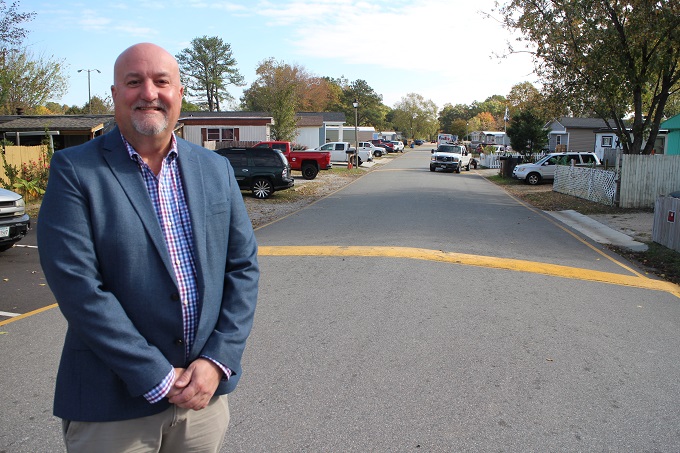
Project:Homes CEO Lee Householder at the Bermuda Estates mobile home park in Chester that the nonprofit has been revitalizing. (Jonathan Spiers photos)
Correction: The mobile homes developed by Project:Homes cost between $100,000 and $130,000 to build, according to the nonprofit. An earlier version of this story reported a higher number that was shared in an interview but was later clarified to be the cost of the nonprofit’s single-family infill homes.
Despite a setback this spring that prevented it from building its own manufacturing facility next to its headquarters, a local housing nonprofit is making its case for investing in mobile home parks as a housing supply option, with its work at a park in Chester providing an example.
Project:Homes, through a joint venture with VCDC (Virginia Community Development Corp.), is three years into a multimillion-dollar effort to enhance and revitalize Bermuda Estates, a 50-home park they purchased in 2020 with the goal of introducing a new park ownership model and approach to mobile home design and construction.
The decades-old park sits off Route 1 in Chester, in a booming commercial corridor near the highway’s intersection with West Hundred Road. The property has been gradually transforming unit by unit – with Project:Homes working with residents to replace their aging homes, as well as with Chesterfield County to improve the park’s infrastructure with upgrades to its access road, water and sewer, and lighting.
Community outreach and programming has been part of the effort, and a former auto garage building near the park’s entrance was converted into a community center. A playground beside the building also is in the works.
Project:Homes CEO Lee Householder described Bermuda Estates as a new approach to addressing housing availability for the nonprofit. It has previously focused on new construction and repairs of existing houses and townhomes to enhance housing options for lower-income households.
“It is a big part of the affordable housing solution that we think we can have a large role in influencing,” Householder said.
Mobile homes had not been on the group’s radar, he said, until Project:Homes was brought in to help repair units in another Route 1 park that had been subject to multiple building code violations. While it wasn’t able to invest further in that park, Householder said the experience opened the group’s eyes to mobile homes as a housing supply option.
“In many ways, mobile homes were ignored as a part of the affordable housing continuum, mostly because of stigma,” Householder said. “I felt like I was even one of those people; we focused on other things. The mobile homes were just so highly stigmatized by ‘trailer parks.’
“We started learning about mobile homes, and we found out there’s as many mobile homes in our region as there are public housing units; they’re the largest form of un-subsidized housing in the country; they’re one of the largest forms of affordable housing, period; and our region has a fair amount of them in areas like this.”
When Bermuda Estates came up for sale, Project:Homes and VCDC together made a nearly $2 million purchase. Householder said the deal included a settlement with the property’s previous owner, J&J Equities LLC, stemming from legal action from the county due to code violations.
The group raised $4 million in public and private funds to invest in unit replacements and infrastructure improvements. That included more than $200,000 in federal funding from Chesterfield that went toward repaving the access road, adding speed bumps and a turnaround for school buses, redefined parking spaces, and updated security lighting.
Householder described the collaborative effort as proof that a different approach to mobile home park ownership and management is possible. He said most parks across the country are owned by large REITs or other operators who view them as “cash cows” with guaranteed income and little incentive for investment in maintenance or upkeep.
Despite the homes’ description as mobile, Householder noted, “You’re never moving it. They don’t ever go anywhere. If you’re an owner of a park and everyone owns their unit, they’re not going anywhere, so you’re guaranteed rent, and then you can continue to raise that rent and provide very little support.
“We wanted to redefine this model of ownership,” he said. “There are good examples across the country, but just a few in Virginia. Then we embarked on the idea of replacing as many units as people were interested, and then engaging and understanding the community and building trust and incorporating them into decision processes.”
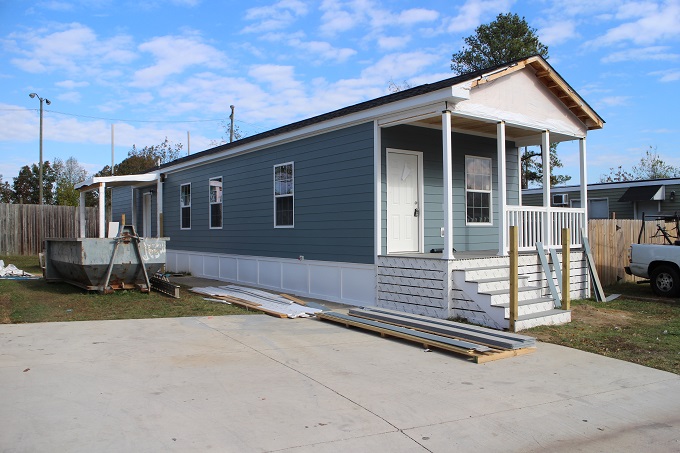
Featuring conditioned crawl spaces and roofs with eaves, the new units were designed through a collaboration with Virginia Tech.
For the new units, Project:Homes worked with Virginia Tech on a mobile home design that includes several modifications aimed at improving stability and energy efficiency. Tweaks were made to ceiling height and interior layouts to maximize space and add more natural light, and the design included a conditioned crawl space and added eaves to the roof to allow for rainwater spill-off.
With its new design in-hand, Householder said the group then looked into manufacturing the mobile homes itself, leading to its proposal earlier this year to add what he described as a small-scale manufacturing facility next to its headquarters in South Richmond.
The proposal had the support of city planning staff and the Planning Commission, but it was shot down by City Council at the urging of Michael Jones, the area’s representative. Jones argued that the location, on Carnation Street just south of Midlothian Turnpike, was unsuitable for a warehouse because it would encroach on existing houses adjacent to the property.
While the denial was unexpected, Householder said Project:Homes continues to look at options to establish its own manufacturing facility in the area. In the meantime, he said it has worked with mobile home builder Champion Homes to manufacture its design for Bermuda Estates.
Of the denial, Householder said, “We were shocked, and we’re still kind of recovering from that shock. But strategically we are trying to decide the role of manufactured housing as a business unit at Project:Homes, and we’re in a strategic planning process that we will clarify in the next six months. Thankfully we found a way to keep replacing (units) in Bermuda without having to build them ourselves.”
Householder said each mobile home costs between $100,000 and $130,000 to build. To make them “affordable,” Project:Homes generally prices them $50,000 lower, with private and public funding sources making up the difference.
Due to the household income levels at Bermuda Estates, Householder said the homes there are priced even lower, from $35,000 to $50,000.
Of the $4 million raised for Bermuda Estates, Householder said over half of that has been deployed so far. In addition to Chesterfield providing Community Development Block Grant funds, financial support has come from the Bob & Anna Lou Schaberg Foundation, Virginia Housing, Virginia LISC (Local Initiatives Support Corp.) and Robins Foundation.
Householder said Project:Homes is aiming to replace 25 of the park’s 50 homes over the next five years. He said a goal is to invest in and potentially develop additional mobile home parks, though he noted challenges in competing with REITs and other buyers and overcoming the aforementioned “trailer park” stigma.
“The barriers to entry are just so high,” he said, noting one nearby park that he said recently sold for three times what they paid per-lot for Bermuda Estates.
“One of our visions is potentially building a new community in the future. We feel like if we can bring people to Bermuda Estates and (show) how this is a strong form of affordable housing, it might open and reduce barriers to building a new community at this scale,” he said, adding: “We think there are great opportunities in our region for that.”
Of what’s been accomplished at Bermuda Estates so far, Householder added, “We feel like it’s been a successful journey and it’s helped stabilize essential affordable housing, and it has us looking to what our future potential is in the manufactured housing space.”

Project:Homes CEO Lee Householder at the Bermuda Estates mobile home park in Chester that the nonprofit has been revitalizing. (Jonathan Spiers photos)
Correction: The mobile homes developed by Project:Homes cost between $100,000 and $130,000 to build, according to the nonprofit. An earlier version of this story reported a higher number that was shared in an interview but was later clarified to be the cost of the nonprofit’s single-family infill homes.
Despite a setback this spring that prevented it from building its own manufacturing facility next to its headquarters, a local housing nonprofit is making its case for investing in mobile home parks as a housing supply option, with its work at a park in Chester providing an example.
Project:Homes, through a joint venture with VCDC (Virginia Community Development Corp.), is three years into a multimillion-dollar effort to enhance and revitalize Bermuda Estates, a 50-home park they purchased in 2020 with the goal of introducing a new park ownership model and approach to mobile home design and construction.
The decades-old park sits off Route 1 in Chester, in a booming commercial corridor near the highway’s intersection with West Hundred Road. The property has been gradually transforming unit by unit – with Project:Homes working with residents to replace their aging homes, as well as with Chesterfield County to improve the park’s infrastructure with upgrades to its access road, water and sewer, and lighting.
Community outreach and programming has been part of the effort, and a former auto garage building near the park’s entrance was converted into a community center. A playground beside the building also is in the works.
Project:Homes CEO Lee Householder described Bermuda Estates as a new approach to addressing housing availability for the nonprofit. It has previously focused on new construction and repairs of existing houses and townhomes to enhance housing options for lower-income households.
“It is a big part of the affordable housing solution that we think we can have a large role in influencing,” Householder said.
Mobile homes had not been on the group’s radar, he said, until Project:Homes was brought in to help repair units in another Route 1 park that had been subject to multiple building code violations. While it wasn’t able to invest further in that park, Householder said the experience opened the group’s eyes to mobile homes as a housing supply option.
“In many ways, mobile homes were ignored as a part of the affordable housing continuum, mostly because of stigma,” Householder said. “I felt like I was even one of those people; we focused on other things. The mobile homes were just so highly stigmatized by ‘trailer parks.’
“We started learning about mobile homes, and we found out there’s as many mobile homes in our region as there are public housing units; they’re the largest form of un-subsidized housing in the country; they’re one of the largest forms of affordable housing, period; and our region has a fair amount of them in areas like this.”
When Bermuda Estates came up for sale, Project:Homes and VCDC together made a nearly $2 million purchase. Householder said the deal included a settlement with the property’s previous owner, J&J Equities LLC, stemming from legal action from the county due to code violations.
The group raised $4 million in public and private funds to invest in unit replacements and infrastructure improvements. That included more than $200,000 in federal funding from Chesterfield that went toward repaving the access road, adding speed bumps and a turnaround for school buses, redefined parking spaces, and updated security lighting.
Householder described the collaborative effort as proof that a different approach to mobile home park ownership and management is possible. He said most parks across the country are owned by large REITs or other operators who view them as “cash cows” with guaranteed income and little incentive for investment in maintenance or upkeep.
Despite the homes’ description as mobile, Householder noted, “You’re never moving it. They don’t ever go anywhere. If you’re an owner of a park and everyone owns their unit, they’re not going anywhere, so you’re guaranteed rent, and then you can continue to raise that rent and provide very little support.
“We wanted to redefine this model of ownership,” he said. “There are good examples across the country, but just a few in Virginia. Then we embarked on the idea of replacing as many units as people were interested, and then engaging and understanding the community and building trust and incorporating them into decision processes.”

Featuring conditioned crawl spaces and roofs with eaves, the new units were designed through a collaboration with Virginia Tech.
For the new units, Project:Homes worked with Virginia Tech on a mobile home design that includes several modifications aimed at improving stability and energy efficiency. Tweaks were made to ceiling height and interior layouts to maximize space and add more natural light, and the design included a conditioned crawl space and added eaves to the roof to allow for rainwater spill-off.
With its new design in-hand, Householder said the group then looked into manufacturing the mobile homes itself, leading to its proposal earlier this year to add what he described as a small-scale manufacturing facility next to its headquarters in South Richmond.
The proposal had the support of city planning staff and the Planning Commission, but it was shot down by City Council at the urging of Michael Jones, the area’s representative. Jones argued that the location, on Carnation Street just south of Midlothian Turnpike, was unsuitable for a warehouse because it would encroach on existing houses adjacent to the property.
While the denial was unexpected, Householder said Project:Homes continues to look at options to establish its own manufacturing facility in the area. In the meantime, he said it has worked with mobile home builder Champion Homes to manufacture its design for Bermuda Estates.
Of the denial, Householder said, “We were shocked, and we’re still kind of recovering from that shock. But strategically we are trying to decide the role of manufactured housing as a business unit at Project:Homes, and we’re in a strategic planning process that we will clarify in the next six months. Thankfully we found a way to keep replacing (units) in Bermuda without having to build them ourselves.”
Householder said each mobile home costs between $100,000 and $130,000 to build. To make them “affordable,” Project:Homes generally prices them $50,000 lower, with private and public funding sources making up the difference.
Due to the household income levels at Bermuda Estates, Householder said the homes there are priced even lower, from $35,000 to $50,000.
Of the $4 million raised for Bermuda Estates, Householder said over half of that has been deployed so far. In addition to Chesterfield providing Community Development Block Grant funds, financial support has come from the Bob & Anna Lou Schaberg Foundation, Virginia Housing, Virginia LISC (Local Initiatives Support Corp.) and Robins Foundation.
Householder said Project:Homes is aiming to replace 25 of the park’s 50 homes over the next five years. He said a goal is to invest in and potentially develop additional mobile home parks, though he noted challenges in competing with REITs and other buyers and overcoming the aforementioned “trailer park” stigma.
“The barriers to entry are just so high,” he said, noting one nearby park that he said recently sold for three times what they paid per-lot for Bermuda Estates.
“One of our visions is potentially building a new community in the future. We feel like if we can bring people to Bermuda Estates and (show) how this is a strong form of affordable housing, it might open and reduce barriers to building a new community at this scale,” he said, adding: “We think there are great opportunities in our region for that.”
Of what’s been accomplished at Bermuda Estates so far, Householder added, “We feel like it’s been a successful journey and it’s helped stabilize essential affordable housing, and it has us looking to what our future potential is in the manufactured housing space.”

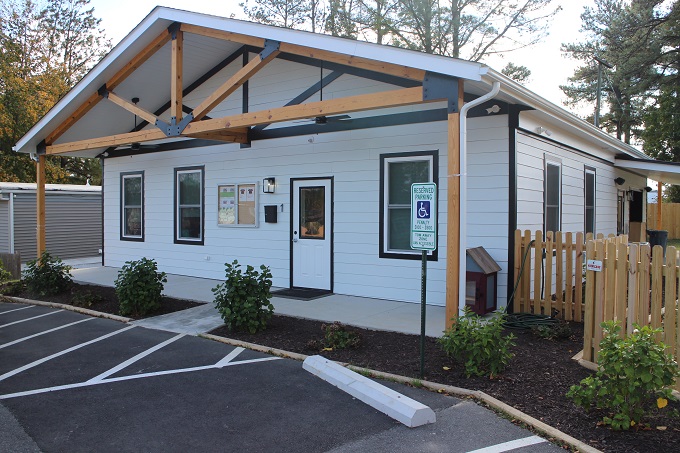
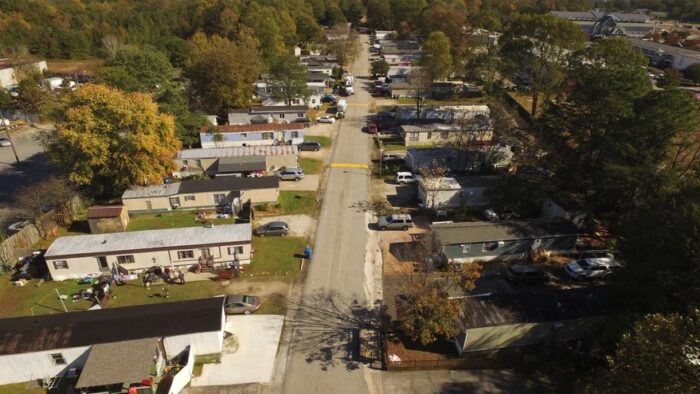
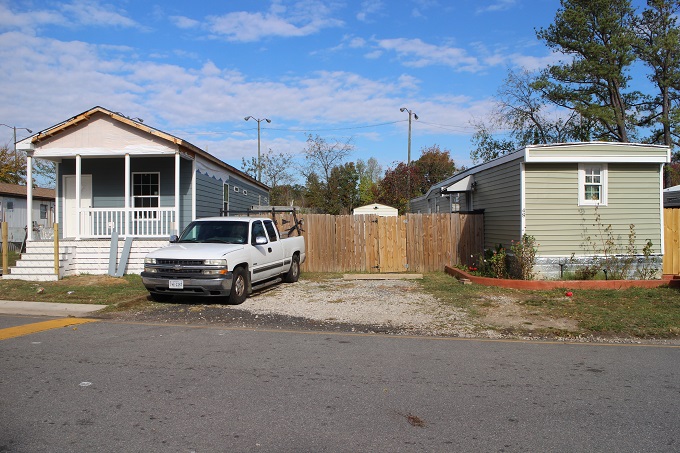


You know things are out of whack when we’re trying to renovate mobile homes as a way of making home ownership affordable. I know full well as I grew up in a trailer park, Kosmo Village, back in the 80s. While I applaud the effort of Lee and his team, we really need some way of incentivizing developers/builders to start constructing more ‘starter homes’ and less $500k McMansions.
Your point is well taken. At the BizSense real estate round table on October 4, Laura Lafayette stated that in order to support affordable housing efforts in the RVA MSA, we need inventories of new and existing houses in the <$250k range. This was roundly met with guffaws and smirks from the developers attending. For the skeptics and cynics: the execution (and vision) at Bermuda Estates is not your grandfather’s trailer park. I know; I’m a grandfather and briefly lived in one in the late ’70s. Last week, the Homes & Neighborhood’s team at Livability Initiative (focused on accessibility AND… Read more »
This is an excellent concept because costs of manufacture can better be contained and because there can more readily be oversight at a mobile home park (noise, trash, beautification, crime). Three days a week I drive past a similar, totally run down, mobile home park on US1 (near Terminal Ave., in the city, I believe). I suggest that Lee and his group take a look. That one is right on the bus line, so good location, and it is in desperate need of a facelift.
$250,000 to build a mobile home?!?
Maybe for a triple-wide luxury mobile home, that is possible. But something seems very fishy about this.
The part of the article was incorrect, our costs are $100,000- $130,000 for mobile homes, the $250,000 quote was referring to our current stick built in-fill single-family home.
The article was incorrect on the price. Our price is approx. $130,000 per unit.
Thank you for correcting the article
Luxury Prefab homes are growing in popularity out west. Those could easily cross $300 per square foot to build. I do not get the feeling that this is that kind of project. I do not understand how they can justify $250k to build one. The average double-wide is like $150k in 2023 to build. Where is the rest of the money going? Did VCU Health help plan the development of this project too?
I am retracting this comment. Lee Householder responded above stating this the article was incorrect on the cost to build. $130k per mobile home is squarely within the national average. Best of luck to you Lee!
This article fails to mention the fact that manufactured homes, unlike traditional homes, decrease in value over time.
Yeah, that’s my biggest gripe because you don’t own the land and you don’t build wealth in an increasing value of the structure. Can you imagine putting $200,000 into a structure and 10 years down the road it’s only worth $125,000.
Lee, now that the pricing issue has been addressed, can you help me understand a few other features of the project? For these homes to be assets to those who have been challenged to find housing, what are the transfer rights for the recipients of these homes? For example, let’s say a person gets a subsidized home, where she has a mortgage of $50k for a property that has a market value of $150k. Is there anything preventing the immediate arbitrage? On the flip side, we also want to encourage upward economic mobility. Could that equity that the homeowner gains… Read more »
I applaud Lee and the work his team is doing to bring affordable housing to the metro area. But I also need to climb on my soap box and recommend building more duplex houses of all styles and sizes in any single-family zoning district. Their construction is extremely limited by outdated zoning ordinance. Also – we’ve made progress with allowing ADU’s but it’s time to incentivize their construction with tax abatements.